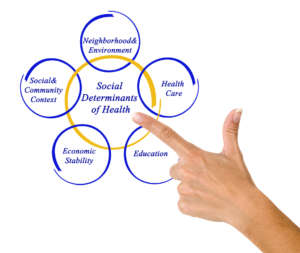Called the Social Determinants of Health (SDOH), these factors include:
- The resources required to meet daily needs, such as safe, affordable housing and access to local food markets.
- Social support, education and literacy, and economic and job opportunities.
- Access to health care and services.
- Safe and clean neighborhoods free of poverty, crime, and life-threatening toxins.
- Transportation options.
- Access to mass media and emerging technologies, such as cell phones and the Internet.
- Good community design with access for people with disabilities, green space (grass and trees), sidewalks, bike lanes, and recreational settings.

These factors may have the greatest impact on the health of the elderly and the disabled. For example, many individuals in those sectors have limited income, which can result in inadequate housing or homelessness, poor diets, and fewer opportunities for employment, education, and/or improved overall physical and mental health. Experts also say that there is a greater likelihood that the low-income elderly and disabled live in neighborhoods that are deteriorated and crime-ridden, with limited access to quality produce and opportunities for social interaction.
In an effort to improve the general health of its enrollees, Medicaid, or Medi-Cal as it is known in California,–which provides assistance to low-income individuals–offers programs that specifically address the Social Determinants of Health. The goal is to encourage cost-effective improvements in health outcomes, rather than just increase the volume of medical services utilized. Those programs include:
- The Accountable Health Communities Model. Introduced in 2016 by the Center for Medicare and Medicaid Innovation (CMMI), this program focuses on linking Medicare and Medicaid recipients with appropriate community services to address health-related social needs. Funding is provided for screening, referral, and community navigation services that reduce health care costs, and the inpatient and outpatient utilization of hospital services. CMMI grants have been awarded to 32 organizations for programs that will be conducted over a five-year period.
- State Innovation Models. This CMMI program provides technical and financial support to the states for state-led multi-payer health care payment and service delivery models. The programs must target improved health system performance and quality of care, and decreased health care costs. More than half of the 50 states have been awarded nearly $950 million in grants. In the first round, innovative payment and delivery models are designed and tested. In the second round, states are required to develop a statewide plan to improve the health of the targeted populations. For example, Ohio developed a program to enable primary care providers to connect patients with social service and community-based prevention programs. Delaware used the funds to create 10 Healthy Neighborhoods, which promote healthy lifestyles, maternal and child health, addiction treatment and prevention, mental health, and chronic disease prevention and management.
- Support of housing-related initiatives. Studies show that people who are homeless are more susceptible to infectious diseases, such as pneumonia, tuberculosis, and HIV/AIDS. While Medicaid funds cannot be used to pay for room and board, they can be used for referral, support, and case management services that enable enrollees to secure stable housing. A preliminary analysis of such programs reveals after a person receives housing, there is a significant reduction in hospitalization, emergency department visits, and Medicaid acute care costs.
Other health care systems have begun addressing social determinants of health as well.
For example, the Humana Foundation awarded $750,000 in grants to South Florida nonprofits to improve community health, including the introduction of telehealth, community gardens, lifestyle interventions for those with chronic diseases, and education programs for other health conditions.
UnitedHealthcare (UHC) has invested more than $400 million in addressing SDOH, including the funding of more than 80 affordable housing communities, providing more than 4,500 homes to people in need. In one state, UHC found that among the newly housed population, emergency room admissions dropped 60 percent and the total cost of health care was cut in half. UHC has also funded food banks, dental and vision screenings, and immunization programs.
Non-health sectors are also analyzing their impact on SDOH, including:
- The relationship between public transportation and access to employment, health care, affordable healthy foods, and other important drivers of health and wellness.
- The effect of nutrition programs on low-income communities, including farm-to-school programs, and community and school gardens.
- The value of early childhood education on health and safety for low-income families.
According to Medicaid, both insurers and healthcare providers play an important role in addressing SDOH and health outcomes. For that reason, it is anticipated that efforts to integrate SDOH into public and private health care programs will continue.
[Ad] Are you a resident of Walnut Creek or the greater East Bay needing help with your estate plan? At Absolute Trust Counsel, your family’s safety is our number one priority. We understand how complicated it can be to know if you’re making the right legacy planning decisions, which is why we’re here to make things easier. Schedule a free discovery call, and let’s talk about how we can help build the right plan for you and your family. Or, if you have a question about the content in this blog, please feel free to get in touch with us by calling 925.943.2740 or sending an email to Info@AbsoluteTrustCounsel.com.
Looking for more resources? Absolute Trust Counsel has a library of free articles, checklists, and guidebooks to address the most common estate planning questions in easy-to-understand language. Explore those listed below, or for more, visit https://absolutetrustcounsel.com/resources.

